Assassin's Creed Origins was one of the biggest releases of 2017 and it was the most important release for Ubisoft - Did the extra year of development time helped the game and whether the game brings something new to the table for the Assassin's Creed series veterans? Let's find out in our Assassin's Creed Origins Review.

Has really Assassin's Creed Origins' gameplay changed?
Assassin's Creed has deeply changed in Origins. Ubisoft has revisited most of the mechanics at the core of the gameplay, beginning with combat. The combat system is now much profound in comparison with the previous entries of the series. Based on an RPG-style leveling system, combat reads each situation providing you with more or fewer chances to win the fight and, even though this can be frustrating at times, it, sure enough, gives you a lot more of a challenge in regards of Syndicate & co. On top of that, the way it plays is different and much more in the likes of the soul like genre: you need to parry and dodge, especially at the beginning of the fight, in order to have a chance to beat your opponent; it is often a matter of button mashing all over again, but when you have multiple targets on the screen, since they're basically unlocked and not tied to a specific turn in order to make their move (you'll see arrows raining from all over the place, for instance), it's very important you rely on your shield so you can get out alive and on your feet. In that perspective, Ubisoft has introduced a loot system based on rarity ranks and levels, which I found interesting for two reasons: 1. you can obtain stuff you almost become attached in several side quests, because of their look and feel or visual rarity; 2. especially when this happens, you have the chance to raise the level of your weapon or piece of equipment at certain shops throughout the Egyptian location. So as it is fundamental that you raise your Bayek's level on par with the main story missions before you face them, because even one level below and you'll get totally busted, it's critic that you continuously have updated stuff in your inventory (both new or updated with the power of your Dracmas), too.
Is Egypt the right location for the job?
The Egyptian setting is clearly inspired and looks the best choice Ubisoft could have opted for when it came to building a sort of reboot to the franchise. It's the closest location to the original Assassin's Creed's, both in terms of storyline, relationships between each character and pure feeling, and it is as magic as you would expect Ancient Egypt to be. Surfing through the desert is an amazing feeling, especially when the game randomly pours sandstorms above your head with Mad Max-like shiny gold walls coming your way, and all the monuments you'd think an Egyptian video game should feature are in the place. It's crazy when the game tells you "ok, it's time to go the Gyza's Pyramids" and you have them right in front of you, with the chance to get on top of that and even enter them both freely and in the occasion of couple story/side missions. As a person who's studied that period in history and is pretty passionate about the matter, again, it's simply magic; walking through the corridors of the tombs, I got to tell myself "back in the days, I would've never guessed I'd have the chance to actually visit, with this fidelity, the Pyramids". Well, that's happened, and it's a merit Ubisoft needs to be awarded: Assassin's Creed is the sole franchise which would've been able to go to such locations and be as true to them as Origins actually is.
What about characters, both fictional and from history?
As all the other games in the series, Assassin's Creed Origins heavily relies on historical characters dropped into slightly different and unusual contexts. In comparison with Unity and in particular Syndicate, Origins deals with the matter pretty differently, as less of those characters are involved in the process but are probably more important in the flux of the story. For example, Apollodorus is the one who gives you all the contacts to reach the members of the Order of the Ancients, not just one of those guys who provide you with scripted upgrades to your equipment; Cleopatra is pivotal in both defining the mood of the game and grant Bayek is motivated enough to keep fighting in order to have his final revenge; Romans have a role which I should not further detail so you can play the game without any spoilers; and so on. So yes, Ubisoft has involved way fewer characters from history in comparison with other Assassin's Creed entries, but at least has secured all of them have meaningful parts in the development of the storyline and the fictional characters in the game. And that's a crucial thing to happen to an AC game, as especially throughout the last few chapters we've seen less charismatic and charming protagonists in favor of secondary characters who wouldn't provide anything more to their names and faces to the lore; here you deal with Bayek and his friends like you'd do in an RPG, and you end up almost feeling like you're him or them at the end of the title.



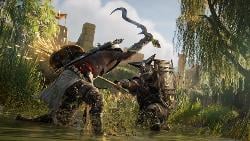
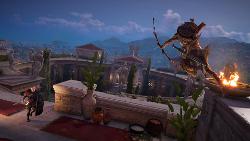
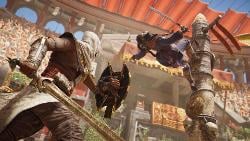
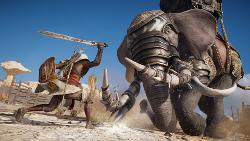
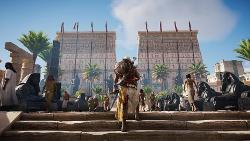

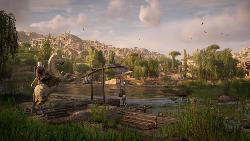
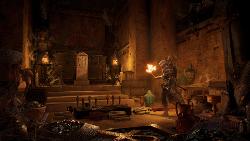

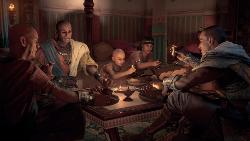
إرسال تعليق